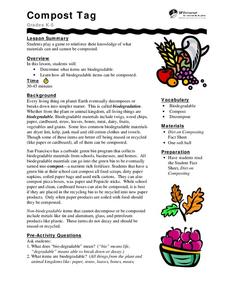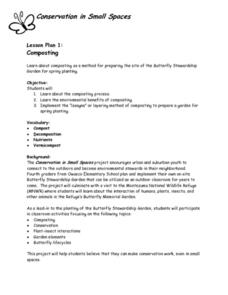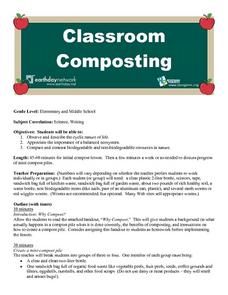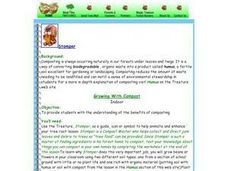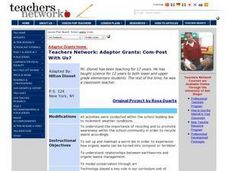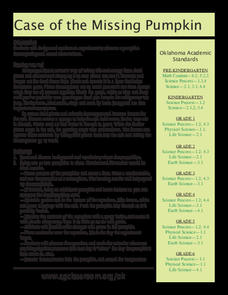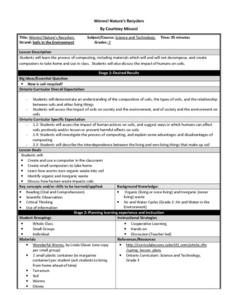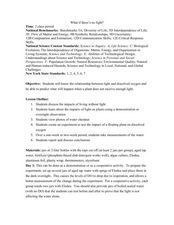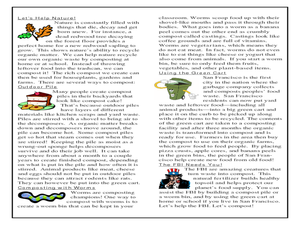SF Environment
Compost Tag
Composting is a great way to get children involved in recycling. First, they discuss how biodegradable products decompose to make compost. Then, they talk about what can and cannot be composted. They play a game similar to around the...
Curated OER
Conservation in Small Places - Composting
A fabulous instructional activity introduces the art of composting to your gardeners. In it, youngsters learn about the composting process and how it actually works. They discuss the environmental benefits of composting, and use the...
Science Matters
Crawly Composters
Get your hands dirty with an interactive instructional activity that showcases the process of decomposing and returning nutrients back into the soil. After building a compost pile, pupils regularly observe the...
United Nations
Compost Monitor Training
What should go in the trash, and what can be composted? Guide your young conservationists through the process of composing their trash with a lesson about the different ways we can dispose of garbage. Using a trash bag with clean...
Curated OER
Classroom Composting
Students discover the benefits of composting. They identify the steps of decomposition as well. They are read a book and discuss what items decompose.
Curated OER
Composting With Worms
Third graders predict what happen in two (control and experiment) containers -- one with soil and trash, the other with soil, trash, and worms.
Curated OER
Learning About Composting
Students can create a compost pile to learn about the decomposition process.
Curated OER
Cows, Worms and Compost
Third graders explore agriculture by viewing a PowerPoint presentation in class. In this animal relationship lesson, 3rd graders identify the types of farm animals humans feed on and their dependency on such small insects like worms....
Curated OER
Life In the Soil: Home Sweet Home: Red Worms
For this soil worksheet, students complete 2 pages about the importance of soil in plant growth. Students read about red worms and answer 2 questions about composting. Students fill out a chart with their observations of plants planted...
Curated OER
Growing With Compost
Students discuss the positives and negatives of composting. They plant their own plant using composting material and record results. They create a poster for the classroom.
Curated OER
Organic and Inorganic Waste
Students conduct a scientific investigation about organic or inorganic waste. In this organic or inorganic waste lesson, students create a compost heap to determine the difference between inorganic and organic waste. Students...
Curated OER
Com-Post With Us?
Students discuss the importance of reducing, recycling and reusing materials to help the environment. As a class, they create a worm bin and observe how it turns material in to compost. They use the internet to research the...
Curated OER
Case of the Missing Pumpkin
Scientists define and discuss decomposition, and watch pumpkins decompose and return to soil in classroom experiment. They record the date the experiment began, chart changes in pumpkins on a calendar, count how many days it takes...
Cal Recycle
Conserving Natural Resources
Trying to plan an engaging elementary science unit on natural resources? Conserve your energy! This five-part series of lessons and hands-on activities has exactly what you need to teach young scholars about the importance of conservation.
Curated OER
Worms, Nature's Recyclers!
Learners study what worms need to survive in different environments. They study how worm composting improves soil and reduce waste. They discuss composting techniques and present a puppet show about a worm's life.
Curated OER
Gardening with Your Students
By growing a class or school garden you can teach students about the environment, the life cycle of a plant, and healthy eating.
Curated OER
Vermicomposting
Third graders study vermicomposting. In this vermicomposting lesson, 3rd graders prepare to begin a unit on decomposition by constructing a worm bin. Students collect worms to be used later in experiments.
Curated OER
Rosa Parks Community Garden
Learners explore gardening and nutrition in the Rosa Parks Community Garden. They work in stations to discuss food choices, the life cycles of plants, and mini-composting. After starting in one station, they rotate to try each activity.
Curated OER
It's Just Dirt
Young scholars discover how seed germination varies according to the soil type. In this soil science lesson, students discuss what plants need in order to grow and investigate various types of soil. Young scholars use their senses to...
Curated OER
F.B.I.
Young scholars create a worm bin full of fruit and vegetable scraps wit paper and observe what happens over time. In this decomposers lesson plan, students observe that the fruit and vegetable scraps become new soil.
Curated OER
What If There's No Light?
learners discuss the importance of light and the consequences of living without it. Using a plant as a demonstration, students predict and observe what happens to a plant when it does not receive enough light. In groups, they experiment...
Curated OER
Let's Build a Worm Bin
Students explore the process of decomposition. In this ecology and measurement instructional activity, students prepare a worm home to be used for vermicomposting. Students weigh a group of worms and the added food, recording this...
Curated OER
Recycling & Our Environment
Students present information about recycling to other students. In this environmental protection lesson, students create a puppet show or commercial about the importance of recycling for other students to view.
Curated OER
In a Giants Garden
Students explore the effect of the earths rotation and its relationship to the suns position and the effect that the longer and shorter amount of daylight has on a pumpkin plant which they have planted.


